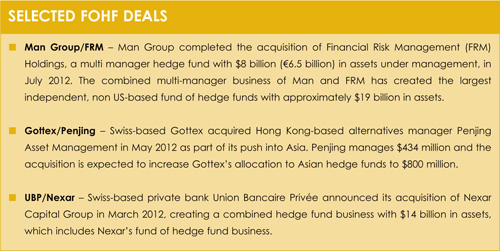Fund of hedge fund providers are under pressure from shrinking assets. Nicholas Pratt examines how they are responding.
The fund of hedge funds (FoHF) industry is under pressure. Private banks and high-net-worth investors have not redeemed or re-entered the market to any great extent since 2009 and the institutional investors that have filled this gap are now moving towards direct allocation.
A recent Preqin survey showed that the average assets under management of an FoHF manager fell from $2.18 billion (€1.77 billion) to $2.09 billion during 2011. An S&P Capital IQ survey revealed that only four of the FoHFs it grades made any money – the average loss of 5.7% was greater than the loss of 5.1% from the S&P Global 1200 equities index.
The pressure on FoHFs has led to a high rate of consolidation and attrition – 2012 has already seen more acquisitions among FoHFs than in the whole of 2011, leaving few opportunities for FoHFs to further mutualise cost by merging (see table for recent examples).
“If you only offer FoHFs then it is important to have a competitive advantage in either hedge fund manager selection or in portfolio construction,” says Manuel Arrive, senior director of the fund and asset manager group at Fitch Ratings. “FoHF providers need to be able to identify alpha at the manager level and they need to be able to maximise alpha at the FoHF level.”
This effectively means working harder to identify niche players that are able to deliver alpha in specialist areas and then concentrating the portfolios on these select managers. It is a move away from the over-diversified, strategy-for-strategy’s sake FoHFs of the past and more about focusing on market risk, uncorrelated sources of alpha and navigating the risk-on/risk-off environments.
“For many FoHFs, it is the last chance to prove themselves to investors who have no problem switching their assets to another FoHF manager or investing directly themselves,” says Arrive.
For some, the main issue is performance as opposed to any fundamental problem with the FoHF model, such as too much complexity or a lack of transparency.
“Investors understand that when they invest in hedge funds, they are getting lower liquidity or less regular reporting in return for better performance,” says Chris Hawkins, head of European research and co-portfolio manager of one the flagship funds at Gottex Fund Management, a Swiss alternatives manager. “But when that performance drops, trustees begin to question the validity of their decision to invest in hedge funds or FoHFs.”
Managed accounts
Consequently, says Hawkins, FoHF providers are having to adapt and one of the adaptations is making FoHFs into more tailored products that are more focused on risk profiles, more specific in terms of mandates and more concentrated on specialist managers. “This is not to say that there are not investors out there interested in broadly diversified commingled funds, but the larger asset managers looking to invest directly in hedge funds have a need for more specialist and more tailored FoHFs,” says Hawkins.
This has led to a demand for managed accounts but Hawkins is not a fan of many of the platform managed accounts.
“People mean different things when they talk about managed accounts. There are those that offer more observable liquidity but are essentially commingled funds so they do not remove the co-investor risk and could possibly increase that risk,” he adds.
“In our view, the managed account is a very powerful tool, whether it be commingled managed accounts or dedicated managed accounts,” says Stephane Enguehard, head of fund of hedge fund development at Lyxor Asset Management.
“They bring more transparency and more flexibility for investors with weekly liquidity reports so they can adjust the portfolio according to their risk appetite. And they bring protection against operational risk and they will grow in popularity with larger investors. I don’t think these investors are looking for simpler structures; it is a more dedicated service that they want.”
Today’s managed accounts also tend to provide a better quality of reporting and analytics, says Enguehard. “For a long time before 2008, traditional FoHF houses were assembling portfolios that had a liquidity mismatch and investors suffered.
“The liquidity terms of the FoHF were not guaranteed and investors were sometimes gated. We now have managed accounts with weekly liquidity reports and alignment between the FoHF and the underlying hedge funds we are investing in.”
Level of visibility
It is a view supported by Akshaya Bargava, chief executive officer and founder of Infrahedge, a UK-based managed account platform, majority-owned by State Street. “Traditional fund of funds reporting was based on returns so that clients could calculate the value of their portfolio. But with daily reporting, the emphasis is on position-based analytics, which gives investors a totally different level of visibility.”
It also allows investors to be more dynamic, provided they are willing to devote the resources to make the most of the data they are receiving. “There is the possibility of data overload so investors have to make sure they have the tools they need to manage this data or else have the service provider present the data in a way that it can be a decision making tool,” says Bargava.
Managed accounts can also help manage specific exposures provided that the underlying liquidity of the hedge funds match the investors’ preferences, says Lisa Fridman, head of European research at Pacific Alternative Asset Management Company. But Fridman also notes that there is a cost involved and this has resulted in some pull back since the post-2008 shift to managed accounts. “Resources are required by the investor as well as the FoHF, so that has to be considered.”
There is also still some demand for the traditional FoHF commingled model, says Fridman, from those investors that want their specific investment requirements met but without the cost of a segregated mandate.
“There might be a greater co-investment risk and they may be harder to customise so the providers really need a homogenous pool of investors to make it work.”
 In addition to managed accounts, FoHF providers are offering more advisory-type services and looking to ease investor concern by sharing their expertise, says Jean-Gabriel Nicolay, head of multi-management at Dexia Asset Management. “FoHF management is primarily about sourcing funds, knowing the cycles, fitting them to investment trends and then using all of this in the portfolio construction. We have to get investors to better understand what they can expect in terms of risk and return.”
In addition to managed accounts, FoHF providers are offering more advisory-type services and looking to ease investor concern by sharing their expertise, says Jean-Gabriel Nicolay, head of multi-management at Dexia Asset Management. “FoHF management is primarily about sourcing funds, knowing the cycles, fitting them to investment trends and then using all of this in the portfolio construction. We have to get investors to better understand what they can expect in terms of risk and return.”
Resources
Investors also want to be more involved, says Faraz Sultan, global head of portfolio management at HSBC Alternative Investments. “It is about bringing the investors as close to the hedge funds as possible – we have no issue doing that for key clients and are happy to introduce them to the managers,” he says. “We are really acting as a consultant and an adviser.”
Sultan says that, due to the relative failure of many fundamental investment strategies, more specialised methods are in demand and this means that manager selection is more important than ever.
“We have focused on complementing the industry stalwarts with newer emerging managers. Looking at the next generation of managers is something we’ve always
done, but to create a portfolio based wholly on new managers is something we’ve started more recently.”
Sultan expects the consolidation among FoHFs in Europe to continue as the demands of institutional investors require an increasing amount of operational capacity from providers. “If you want to offer an advisory service and discretionary mandates, if you want to provide access to well established funds and new managers, and if you want operational due diligence, then you need resources.”
©2012 funds europe





